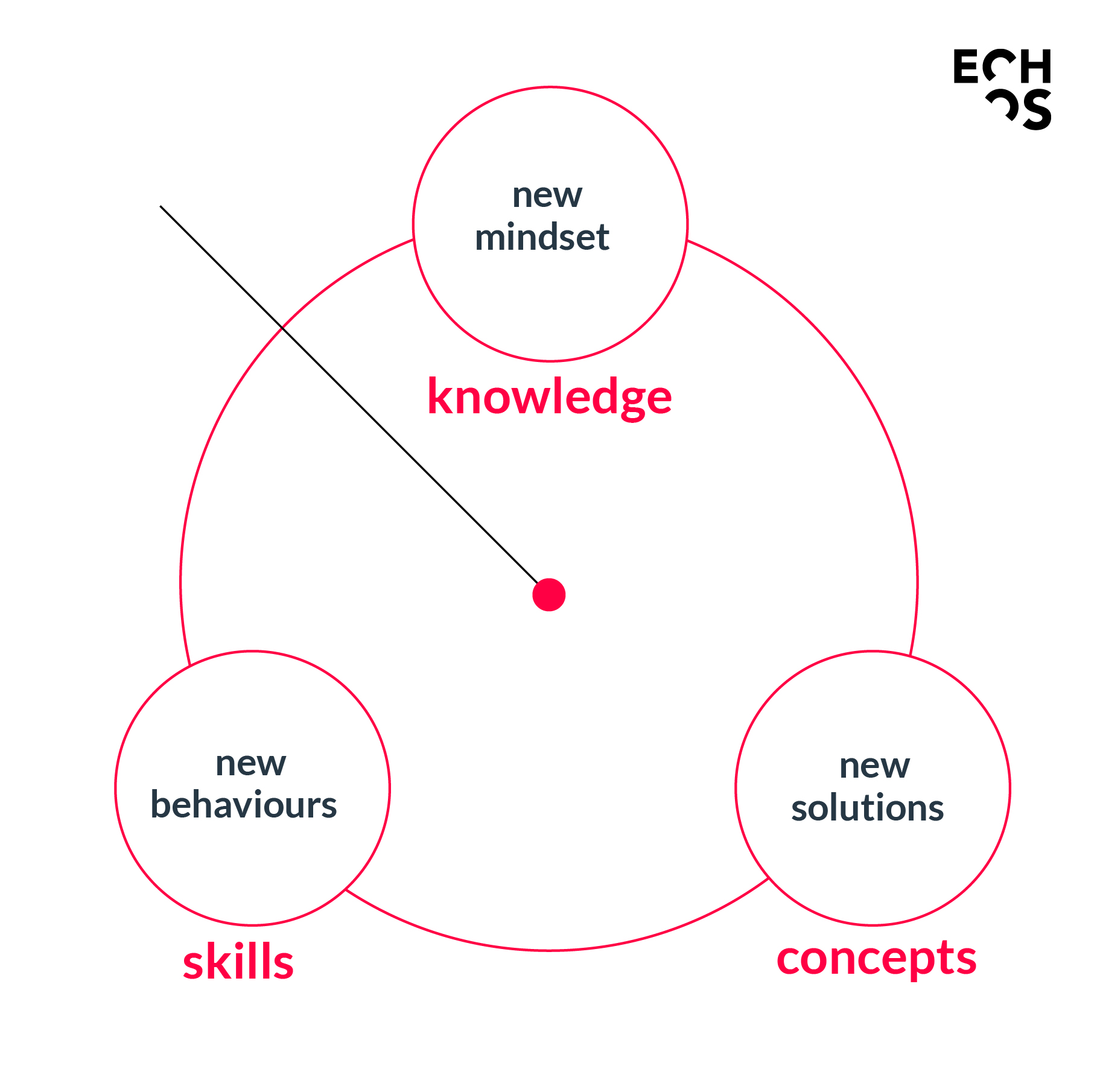You may have heard about an innovative project or idea that was about to take off but ended up never happening. There is so much innovation happening inside of organisations and so many ideas that don’t move forward. Since we founded Echos in 2011, this question kept us wondering why innovative projects or ventures don’t really happen, and how could make innovation happen from the “inside-out” and not just from the “outside-in” in organisations.
You may wonder what do I mean by “outside-in”. Typically, organisations tend to start by looking outside their borders in order to innovate. This involves the traditional benchmark search for their competitor’s initiatives – such as when company directors have their annual Silicon Valley’s trip – or maybe the fact that the company strongly needs to do things differently.
At this point, corporations start to promote hackathons, startup weekends, and invest in their own acceleration and incubator programs, inviting newcomer entrepreneurs and experienced entrepreneurs to help develop ideas that are “connected” to their core businesses.
The problem is that generally speaking, entrepreneurs and big corporations do not get along. Companies have many resources available – like money, communications, distribution channels and client base – but they lack in one: speed. The only competitive advantage that a new venture has is speed, but in all other arenas, startups “lose” when compared to big corporations.
Status and prestige are the most important assets for a corporation. They have structure, scale, financial reach, and power to persuade their stakeholders. They can persuade even governments; it is a known fact that there are companies which more powerful than countries.
Established organisations were designed to perfectly repeat their processes in order to extract maximum performance and quality. However, what brought success to these organisations in the past, won’t have the same success in the future. As a matter of fact, the “outside-in” initiatives are a great way to experience different forms of innovation, but alone, they are not enough to create change inside a huge corporation. These initiatives are just the first step to get people on-board, as they show employees new ways of doing things. In other words, “outside-in” innovation is merely inspirational.
To be successful, corporations need to chase innovation from the “inside-out”. In many instances, the organisational process is both the path to successful innovations and a cause of failure for bigger companies.
How do we create “inside-out” innovations?
If corporations and governments desire to innovate, their first move should be to change their mindset; they need to see things differently. They must remember that the stiffness of their processes is also the killer of innovation. At Echos, we believe innovation only happens through people. We understand that people need to experience new ways of thinking and new ways of doing things and, for that, we created a secure space for trying out ideas.
Before thinking about setting up an innovation department or innovation lab inside your organisation, you should firstly expose your employees and co-workers to different environments and experiences. By encouraging your team to partake on courses, training sessions and open talks, the result will be that they will gain inspiration.
If your goal is to create deeper-seeded innovation roots within your company, you will need to allocate a budget to the human resources team to engage the company’s leadership in innovation training. HR departments know the people that work for your company like no one else; they know what employees want and how to give it to them. Yet, sometimes, HR departments are not included when a company is creating a strategic plan for innovation – this would be a mistake; human resources teams are innovation’s allies.
At Echos, we say to our clients that “everyone wants the miracle of innovation, but nobody wants the pilgrimage”. For the last 5, 10, 20 years, companies have been doing the same things to deliver their goods and services optimally, which means that corporations are hungry to innovate and in desperate need of innovation. Sometimes, starting can be tough, and companies may think that they are able to launch new solutions into the market or approach new markets overnight. They forget that they have become specialists in what they do and the way they do it. Therefore, any nonconformity would be understood as an anomaly of the system.
To solve this problem and design an innovative organisation from the “inside-out”, Echos developed the below approach:
Instead of jumping to the final product, corporations that wish to design new solutions and deliver them through their channels, need to start by focusing on specific people or areas that could help leverage this systemic change in the future. That’s my main concern when it comes to in-company innovation departments and innovation labs: by creating a department of innovation, you are equalising by sending a message to your organisation that innovation is a function of the system and not a value beyond it.
I believe that innovation is transdisciplinary. It is for everyone. It is a state of mind, mood, and behaviour. It is a way of seeing things and feeling things from a different perspective.
The first step towards innovation is a new mindset; a knowledge that acts as the fuel to spark a new behaviour. However, new behaviours only become a habit by practice, and new abilities will only emerge and perfect, if we, as leaders, give our teams the “blank” space to experiment with these new abilities. If they do this, companies will definitely be able to innovate in their original concepts.
*Original article published on LinkedIn. This version of the article was edited by Rani Ghazzaoui Luke.
—
If you’d like to attend Ricardo Ruffo‘s next open talk, sign up today.
Interested in learning the Design Thinking approach? Echos offers two options for Design Thinking courses:
Design Thinking Specialisation
You can also download the Design Thinking Toolkit.
—
Follow us on social
Instagram – Facebook – LinkedIn – Youtube
How Can We Help?
- For training and Innovation Journeys in your company: check out our in-house course offering.
- For upcoming courses in your region: visit our website.
- For upcoming events in your region: look at our event calendar.
- If you have a special project and would like to use Echos’ consultancy services: send us an email.
- Want to speak to a real person? Call us on 1300 502 006



